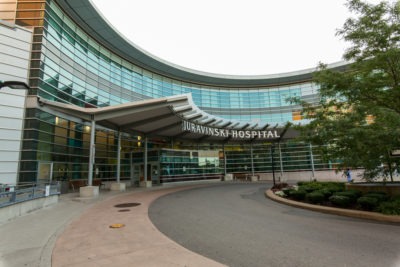For information about visiting during the COVID-19 pandemic, please visit our Appointments & Visiting page.
We provide before and after surgery care for patients who have experienced a broken hip.
Care We Provide
The team will discuss the type of hip fracture you have had and the type of surgery you will need to fix it. To fix the break, pins, screws, plates and/or rods are used to hold the bones together while they heal. Sometimes a break cannot be fixed this way and a partial or total hip replacement may be needed.
Before Surgery
While you wait for hip surgery, it is important that you do not move your broken hip. Our goal is that you will have your surgery within 48 hours of when you arrived in the Emergency Department and it is confirmed that you have broken your hip and need surgery. Pillows or special rolls may be used to keep the hip and leg from moving. Medication is given to control pain. You will have blood work and tests done before your surgery.
Before surgery, we will need a list of all of your present medications, including prescription, non-prescription, herbals and vitamins.
Please have someone bring:
- eyeglasses, hearing aids
- dentures and mouth care products
- a pair of non-slip shoes (shoes without backs are NOT safe)
- clothing underwear, comfortable pants and top
- books, magazines
- personal hygiene items such as deodorant, hairbrush, comb, toothbrush and toothpaste
After Surgery
After surgery, nurses and therapists will help you to sit up, get up and to walk within 12 to 24 hours after surgery. Patients will be encouraged to sit up for their meals.
Pain control
It is normal to have pain before and after surgery. You may need pain medication up to 4 to 5 times a day. It is important to have your pain controlled so that you can do your special hip exercises and move around. Please tell your health care team if you are in pain.
Nausea
You may have an upset stomach or nausea after surgery. If you feel unwell or have nausea, tell your nurse. You will be given some medication to help.
Incision
You will have a dressing (bandage) covering the surgery area for several days. Under the dressing is the incision, which is the cut that the surgeon made to fix your hip.
Going home
Your care team will talk to you and your family about your living situation and what needs to be in place before you can leave the hospital. Patients may need extra support before they are able to go home. Depending on the situation they may go:directly home to a rehabilitation unit, to a convalescent care program or to another area as determined by you and your care team
Team Members
The healthcare team, that will be involved with your care include:
- Orthopaedic surgeons
- Physicians
- Residents
- Nurses
- Business clerks
- Physiotherapists
- Occupational therapists
- Physiotherapy/Occupational therapy assistants
- Environmental aides
- Social worker
- Dietitian
- Pharmacist
Confusion and Delirium
If, as a family member or friend, you notice that your loved one is acting differently or is restless, please tell the nurse.
Delirium is a sudden confused state of mind. It is sometimes called acute confusion. It may occur during an illness or after an operation.
People with delirium can act confused and may:
- have trouble paying attention
- be restless and upset
- slur their speech
- not make any sense
- see and hear imaginary things
- mix up days and nights
- drift between sleep and wakefulness
- be forgetful
- have trouble concentrating
- be more alert than normal
- not know where they are
- have trouble staying awake
- sometimes be confused and then suddenly seem okay
Please refer to the A Broken Hip, Moving Forward booklet for more information about delirium.
Therapy
After surgery, an Occupational Therapist (OT) and a Physiotherapist (PT) will see you to begin therapy.
At first, your nurse or therapist will help you to sit on the edge of the bed, and then they will help you get up and sit in a chair. As you are able, they will help you to start walking with a walker. They will also do exercises with you.
Doing exercises on both legs will help promote good circulation, increase muscle strength and prevent blood clots.
Signs of a blood clot may be redness, swelling, warmth or pain anywhere in either leg. Tell your nurse, doctor or therapist right away, if you notice any of these signs.
Exercises will help you:
- strengthen the muscles in your legs
- move your hip and prevent joint stiffness
- improve blood supply to your legs
If you had a hip replacement surgery, you must follow the 3 hip rules, found in A Broken Hip, Moving Forward, to help your muscles heal and keep your hip in place. Follow these rules for at least 3 months after surgery or until your doctor tells you to stop.

